This Workroom has now ended, but was targeted at science communicators as well as education and learning professionals in museums, science centres, arts organisations and beyond who were looking for new ways to support multi-stakeholder audiences to engage with science-related topics.
At the dawn of the new decade, almost thirty years later, the words of renowned speculative science fiction writer William Gibson continue to ring true:
“the future is already here, it is just not evenly distributed”
Science learning is a hugely powerful tool which at best, can enable citizens to understand, critique, and develop technologies and innovations which will be shared by all. But at worst, science learning can be ring-fenced for the most privileged, limiting engagement with science, technology and innovation to a small subset and further widening the gaps in society by reinforcing systems of inequality. How then do we make sure that the informal science learning sector works in pursuit of justice and equity? How do we empower a diverse generation of scientists, technologists, artists, engineers or mathematicians to be resilient agents of change, who realise a socially just world? We are inviting you to tackle these questions with the help of design fiction, whereby we speculate what kind of future we hope for by interrogating the past and the present.
SySTEM 2020 has used a variety of methods to examine informal science learning across 19 countries, finding evidence for personal growth and achievement at the individual learner level, alongside persisting inequalities at the systemic level.
Over the course of three weeks this Workroom sought to inspire and exercised the imagination to help characterise the future of our field. It provided participants with the practical knowledge and skills to act as agents of change by striving for equity and addressing persisting inequalities in their organisations and their wider learning ecosystems.
Outcomes for participants
- Increased awareness of inequalities in informal science learning and engagement, motivation and support to deconstruct these
- Increased inspiration to develop equitable learning environments
- Increased capacity to embed reflective evaluation at the organisation and learner level
- The experience of working alongside European colleagues striving for equity in informal science learning and engagement
- A hard copy of the Design Principles and Methods Toolkit for Equitable Science Learning developed by SySTEM 2020 (to be posted out to those participants attending all Workroom sessions
Keywords
- SySTEM2020
- informal science learning
- #ecsiteworkrooms
- Ecsite workrooms
Organisers
Registration
This Workroom has now ended. Check out our main Workrooms page for other Workrooms and make sure you are signed up to receive news on Ecsite's events, as more will be coming in the autumn.Events
In this first session of “Imagining futures for informal science learning” we will take inspiration from Keynote speaker Dr. Frederic Bertley.
This week we hear from a number of speakers who will share new tools that can be used to give communities an access point to express themselves and be heard.
In our final week young learners from across Europe will be placed on centre stage: for us to construct a shared narrative of the future we need to understand the experiences and world views of the next generation.









